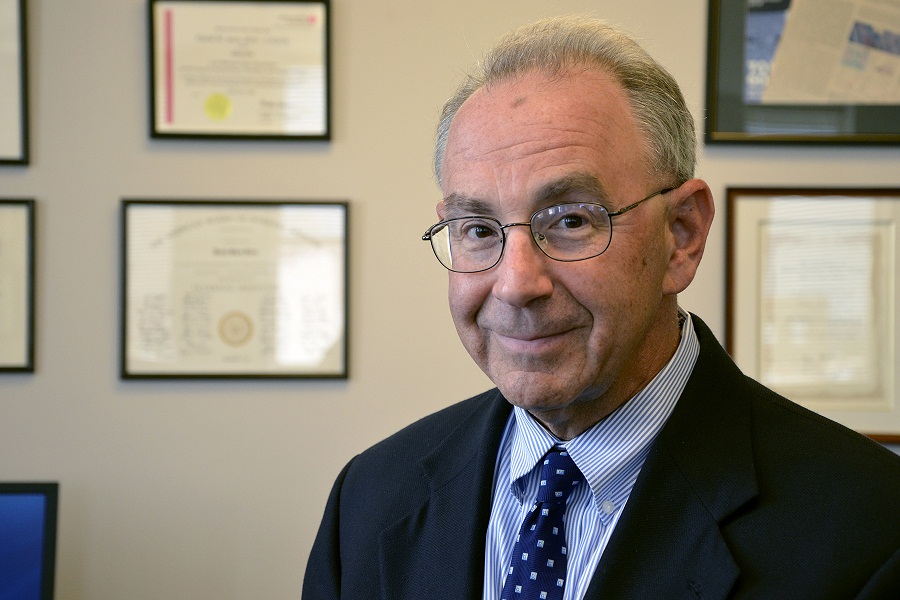
After a highly successful six years as Robert J. Kaplan Executive Dean and vice chancellor for Clinical Affairs at the University of Tennessee Health Science Center, David M. Stern, MD, has been named vice chancellor for Health Affairs for Statewide Initiatives, a new position at UTHSC. Dr. Stern began his new role today.
Dr. Stern’s many accomplishments at the university reflect his commitment to a culture of excellence and community engagement. He has recruited more than 30 nationally-recognized chairs/directors and 65 research-engaged faculty in pediatrics, surgery/surgical oncology, neurology, otolaryngology, radiation oncology, smoking cessation, thoracic surgery, cardiology, informatics, genetics, cancer genomics, health disparities, and other areas.
Dr. Stern led the creation of five new departments, including the first Department of Emergency Medicine in West Tennessee, and oversaw efforts leading to the reaccreditation of the UTHSC College of Medicine for eight years. He led the reinvention of the University Clinical Health faculty practice group, which became a thriving, independent faculty practice, providing both important clinical service to the community, as well as an incubator for clinical innovation by the faculty. He was also integral in the creation of several hospital-based practice plans with Regional One Health and Methodist Le Bonheur Healthcare.
Working with faculty and community partners, including state government at the highest levels, Dr. Stern developed and obtained funding for a mobile unit for the rapid treatment of patients with stroke in Memphis, one of only five such units in the United States when it started operation. He led the creation of the Center for Addiction Science at UTHSC, now designated as the first Center of Excellence in the country and the National Research Center by the Addiction Medicine Foundation in Washington.
He was instrumental in instituting The Center for Health in Justice Involved Youth, the Center for Innovation in Health Equity Research, and other initiatives, all under the auspices of the University of Tennessee Health Science Center in collaboration with community partners.
Dr. Stern created a College of Medicine Advisory Board of community and business leaders to help identify and address the needs of the community, and has been very engaged with the college’s Alumni Council. Philanthropic support for the College of Medicine has increased steadily and significantly each year from $11.5 million when he joined UTHSC in 2011, to $38.2 million in 2016.
As vice chancellor for Health Affairs for Statewide Initiatives, Dr. Stern will focus on the direction and expansion of the initiatives already underway, as well as new initiatives with the goal of ameliorating essential health problems across Tennessee. One new initiative focuses on rural health. He is currently planning and coordinating an integrated primary care program involving the Departments of Family Medicine and Psychiatry in the College of Medicine and Cherokee Health Systems, focusing on adverse childhood experiences and health disparities among Tennesseans. Other community-based projects will include a Department of Pathology serving the city of Memphis, and the Healing Center initiated by Bishop William Young.
The new position created for Dr. Stern reflects a commitment to applying the creativity and skills of the university to improve the wellness of the community. “We are indeed fortunate to have someone of Dr. Stern’s foresight, ability, and energy to carry forward the university’s commitment to the health of our greater community — the state of Tennessee,” said UTHSC Chancellor Steve J. Schwab, MD.
Dr. Schwab will assume the duties of executive dean of the College of Medicine and vice chancellor for Clinical Affairs. A national search for Dr. Stern’s successor will begin immediately. The search will be chaired by UTHSC Executive Vice Chancellor and Chief Operations Officer Ken Brown, JD, MPA, PhD, FACHE, and UT Trustee and former St. Jude Children’s Research Hospital CEO Dr. William Evans.
